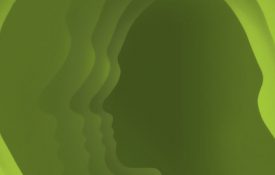-
Pandemic-related trauma is real. We need resources to help people through emotional pain.
An 11-year-old patient of mine changed abruptly from an outgoing, confident boy to an anxious, fearful one after his father developed COVID-19. He now wakes in the middle of the night crying and follows his mother around the house all day. A Catholic priest, who contracted COVID-19 during the first weeks of the pandemic, is a “long-hauler” who wakes each morning with the simple hope he’ll be able to smell a lemon slice in his tea. Like scree, the broad field of rocks, rubble and broken trees left behind as a glacier recedes, we’ll now have to contend with the emotional and social damage left behind by the pandemic.
-
‘Cave Syndrome’ Keeps the Vaccinated in Social Isolation
After being diagnosed with COVID in November 2020, Andrea King Collier doubted the antibodies that she had developed in response to the illness would protect her from a second infection and was determined to be first in, or near the front of, the line for a vaccine. The Flint, Mich., resident registered at every vaccine distribution site she could find and never stopped looking for a way to receive shots early.By February 21 Collier had received her second dose of the Pfizer vaccine.
-
Before You Answer, Consider the Opposite Possibility
In 1906, the British statistician and polymath Francis Galton attended a country fair at which the attendees were invited to estimate the weight of an ox. Out of curiosity, Galton borrowed the cards on which the guesses were written, took them home, and ran the numbers. To his surprise, the average of the 787 entries turned out to be almost exactly the precise weight of the animal. It was more accurate than even the individual estimates of butchers and farmers, who presumably had an eye for such things.
-
You’re Probably Not As Open-Minded As You Think. Here’s How To Practice
... Recognize that your biological hardware isn't exactly setting you up for success. I have bad news for you about your brain: you don't fully know what it's up to. That might sound ridiculous. But in fact, there are tons of things that your brain does without your conscious control, everything from breathing to making split-second associations between things. And those associations aren't always good ones. There's plenty of research in psychology to show that almost everybody in the world has what are called "implicit biases." These are ideas and associations that we pick up from the world around us without even knowing about them.
-

Statement on Racism, Bias, and Intolerance
The APS Board has approved this statement on racism, bias, and intolerance.
-

New Content from Advances in Methods and Practices in Psychological Science
A special section, with seven tutorials introducing the use of simulations in developing statistical intuitions.

